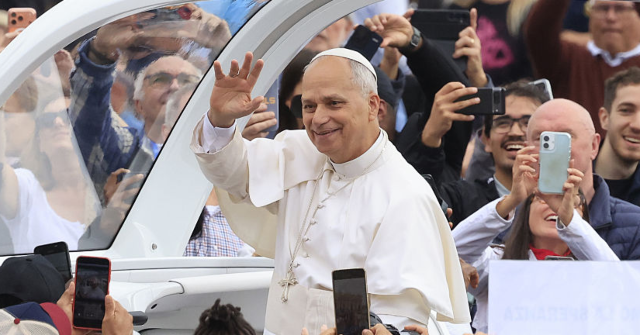The Vatican announced on Tuesday that Pope Leo XIV will make visits to Turkey and Lebanon beginning in late November, his first international travel as the head of the Catholic Church.
The visit to Turkey was an expected journey, timed to coincide with the 1700th anniversary of the Council of Nicaea, in which Constantine the Great, the first Christian Roman emperor, gathered the world’s bishops to create a consolidated Christian religion unified by a series of beliefs about the life and resurrection of Jesus Christ. Catholics regularly recite the resulting statement of belief, the Nicene Creed, as a prayer today.
Some reports had indicated shortly after Pope Leo was elected to lead the Catholic Church that he was interested in visiting Lebanon, a nation suffering for decades through terrorism, religious strife, and political chaos. The Lebanese government has particularly struggled to protect its Christian population from the presence of the Iran-backed jihadist terror organization Hezbollah, which has operated as a political party in the country for decades. Current President Joseph Aoun has prioritized limiting Hezbollah’s influence on the politics of the country during his tenure, aided in part by Hezbollah losing its most prominent leaders in the ongoing war between Israel and the genocidal terrorist organization Hamas which also enjoys Iranian backing.
Vatican News relayed on Tuesday that Matteo Bruni, the director of the Holy See Press Office, confirmed Pope Leo’s travels, noting that the “head of state and Ecclesiastical Authorities” in both Turkey and Lebanon had invited him to visit. In Turkey, Bruni noted, the pope would make “a pilgrimage to İznik on the occasion of the 1,700th anniversary of the First Council of Nicaea;” the Lebanese itinerary is yet to be determined.
The Lebanese National News Agency also confirmed the news.
“In response to the invitation of His Excellency the President of the Republic and the Lebanese ecclesiastical authorities, the Holy Father will make an apostolic visit to Lebanon from Nov. 30 to Dec. 2. The program of the apostolic visit will be announced in due course,” the agency reported, according to Lebanon’s L’Orient-Le Jour. Pope Leo will reportedly be in Turkey from November 27 to 30.
Lebanon’s Council of Catholic Patriarchs and Bishops celebrated the news “with great joy and renewed hope.”
“We hope that this apostolic visit to Lebanon will bring peace and stability and be a sign of unity for all Lebanese, Christians and Muslims alike, at this critical stage in our nation’s history,” the religious leaders said in a statement.
Lebanese outlets reported that Aoun, a Maronite Catholic as required by the Lebanese constitution, also issued a statement welcoming the news of the pope’s visit, calling it “a milestone in the relationship between Lebanon and the Holy See, embodying the Vatican’s steadfast confidence in the country.”
Response in Turkey to the pope’s expected visit has been more muted, as the Christian populations of that country were largely eliminated via genocide at the turn of the 20th century. The Turkish government has never acknowledge the Armenian, Assyrian, and Greek genocides led by the nation’s founder, Mustafa Kemal Atatürk. Under Islamist strongman Recep Tayyip Erdogan, Turkey has become increasingly hostile to Christianity, as the government buys up churches and monasteries to be replaced by mosques. The Erdogan regime has also erased the Christian heritage of the Hagia Sophia, converting it into a mosque and removing Christian relics from the iconic cathedral.
L’Orient reported in August, citing Maronite Patriarch Bechara Rai, that Pope Leo had expressed interest in visiting the country. The Maronite leader told the Saudi news outlet al-Arabiya at the time that Pope Leo was hoping to visit Lebanon “by December,” but that confirmation of the visit was impossible at the time as logistics were still being planned.
The Emirati newspaper The National reported that his visit will also include an in-person meeting with Patriarch Bartholomew I of Constantinople, the head of the Orthodox Christian church. As the Council of Nicaea preceded the Great Schism by about 700 years, both Catholics and Orthodox Christians mark the anniversary of the event as part of their history.
The National reported, citing “Vatican officials,” that Pope Leo was hoping to address victims of the 2020 Beirut port explosion which destroyed much of the capital city and killed 200 people. On August 4, 2025, the five-year anniversary of the disaster, Aoun promised to “bring all those responsible to justice” — following a total lack of arrests or identification of any culpable parties in the affair (Aoun became president in January). The pope marked the occasion with his own message to the Lebanese, sending “compassion to all whose hearts are wounded.
“I implore the merciful Father to welcome, beside him, in his house of rest, of light, and of peace, all those who lost their lives,” he said at the time, entrusting “every Lebanese to the protection and maternal intercession of the Virgin Mary, as well as Saint Charbel and the other Lebanese saints.”
Follow Frances Martel on Facebook and Twitter.
Read the full article here
